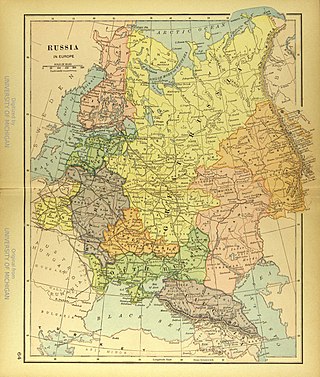Russia , or the Russian Federation, is the largest country in the world by area, located in northern Eurasia.
Contents
Russia may also refer to:
Russia , or the Russian Federation, is the largest country in the world by area, located in northern Eurasia.
Russia may also refer to:
Union commonly refers to:

Smolensk is a city and the administrative center of Smolensk Oblast, Russia, located on the Dnieper River, 360 kilometers (220 mi) west-southwest of Moscow. First mentioned in 863, it is one of the oldest cities in Russia. Population: 316,570 (2021 Census).

The Byelorussian Soviet Socialist Republic, also known as Byelorussia, Belarusian SSR, Soviet Belarus, or simply Belarus, was a republic of the Soviet Union (USSR). It existed between 1920 and 1991 as one of fifteen constituent republics of the USSR, with its own legislation from 1990 to 1991. The republic was ruled by the Communist Party of Byelorussia and was also referred to as Soviet Byelorussia or Soviet Belarus by a number of historians. Other names for Byelorussia included White Russia or White Russian Soviet Socialist Republic and Belorussian Soviet Socialist Republic.

This is a list of historical regions in present-day Ukraine.
Soviet Russia may refer to:

The Ukrainian Soviet Socialist Republic, abbreviated as the Ukrainian SSR, UkSSR, and also known as Soviet Ukraine or just Ukraine, was one of the constituent republics of the Soviet Union from 1922 until 1991. Under the Soviet one-party model, the Ukrainian SSR was governed by the Communist Party of the Soviet Union through its republican branch, the Communist Party of Ukraine.

Priozersk is a town and the administrative center of Priozersky District in Leningrad Oblast, Russia, located at the northwestern shore of Lake Ladoga, at the estuary of the northern armlet of the Vuoksi River on the Karelian Isthmus. It is served by a station of the same name on the St. Petersburg—Khiytola railway. Population: 18,777 (2021 Census); 18,933 (2010 Census); 20,506 (2002 Census); 20,557 (1989 Census).

Great Russia, sometimes Great Rus', is a name formerly applied to the territories of "Russia proper", the land that formed the core of the Grand Duchy of Moscow and later the Tsardom of Russia. This was the land to which the ethnic Russians were native and where the ethnogenesis of (Great) Russians took place. The name is said to have come from the Greek Μεγάλη Ῥωσ(σ)ία, Megálē Rhōs(s)ía, used by Byzantines for the northern part of the lands of Rus'.

Mtsensk is a town in Oryol Oblast, Russia, located on the Zusha River 49 kilometers (30 mi) northeast of Oryol, the administrative center of the oblast. Population: 43,222 (2010 Census); 47,807 (2002 Census); 48,400 (1989 Census); 28,000 (1970).

Pochep is a town and the administrative center of Pochepsky District in Bryansk Oblast, Russia, located 84 kilometers (52 mi) southwest of Bryansk, the administrative center of the oblast. Population: 14,991 (2021 Census); 17,161 (2010 Census); 17,064 (2002 Census); 16,868 (1989 Census).

Meshchovsk is a town and the administrative center of Meshchovsky District in Kaluga Oblast, Russia, located on the Tureya River 85 kilometers (53 mi) southwest of Kaluga, the administrative center of the oblast. Population: 3,810 (2021 Census); 4,100 (2010 Census); 4,540 (2002 Census); 5,382 (1989 Census).
The term Soviet Latvia usually refers to the Latvian Soviet Socialist Republic, a Union Republic of the USSR from 1940 to 1991.

Parfino is an urban locality and the administrative center of Parfinsky District of Novgorod Oblast, Russia, located along the Lovat River, 20 kilometers (12 mi) east of Staraya Russa. Municipally, it is incorporated as Parfinskoye Urban Settlement, the only urban settlement in the district. Population: 7,492 (2010 Census); 8,446 (2002 Census); 8,299 (1989 Census).
Rus or RUS may refer to:

The Russian Soviet Federative Socialist Republic, previously known as the Russian Soviet Republic and the Russian Socialist Federative Soviet Republic, as well as being unofficially referred to as Soviet Russia, the Russian Federation, or simply Russia, was an independent federal socialist state from 1917 to 1922, and afterwards the largest and most populous constituent republic of the Soviet Union (USSR) from 1922 to 1991, until becoming a sovereign part of the Soviet Union with priority of Russian laws over Union-level legislation in 1990 and 1991, the last two years of the existence of the USSR. The Russian SFSR was composed of sixteen smaller constituent units of autonomous republics, five autonomous oblasts, ten autonomous okrugs, six krais and forty oblasts. Russians formed the largest ethnic group. The capital of the Russian SFSR and the USSR as a whole was Moscow and the other major urban centers included Leningrad, Stalingrad, Novosibirsk, Sverdlovsk, Gorky and Kuybyshev. It was the first socialist state in the world.
Kuban is a geographic region in Southern Russia.
In Russia, efforts to build communism began after Tsar Nicholas II lost his power during the February Revolution, which started in 1917, and ended with the dissolution of the USSR in 1991. The Provisional Government was established under the liberal and social-democratic government; however, the Bolsheviks refused to accept the government and revolted in October 1917, taking control of Russia. Vladimir Lenin, their leader, rose to power and governed between 1917 and 1924.
Crimea, or the Crimean Peninsula, historically also known as the Tauric Chersonese, is a major peninsula in the north of the Black Sea.